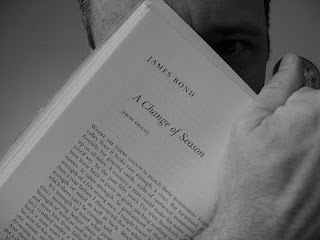

Anne Tyler - October 25, 1941
On my first pass of the Introduction, I found it rather...well...bland. So, what I’ll do now is sit the book beside me, and re-read it and pull out some lines which should be reconsidered as they can’t be called “bland”.
...”Why is it, then, that so many short stories lose their bloom in the time it takes me to store a magazine on my closet shelf? Why is it that some few do not? What makes those few any different?
Well, this is the year I found out, more or less.”
About Shannon Ravenel and her reading for The Best American Short Stories 1983 –
(Ravenel)...”read 1379 stories published in 502 issues of 154 different magazines.”
On her own selection of some of the stories to fill BASS 1983
“For one whole afternoon, I sat in the middle of a rug and rearranged tear sheets around me like so many parts of a jigsaw puzzle. Then I went off and left them. Some stories I noticed, hung on in my mind while I was busy with other tasks. Some evaporated. Some I returned to the following day and found, when I picked them up, that they sprang back whole into my memory, all of a piece, as if carved from a single block. Those were the real successes.”
And then this important line –
“Well, in the long run, this much emerged:
It seems to me that almost every really lasting story – almost, you notice- contains at least one moment of stillness that serves as a kind of pivot.”
and
“All really satisfying stories, I believe, can generally be described as spendthrift.”
...
“A spendthrift story has a strange way of seeming bigger than the sum of its part; it is stuffed full; it gives a sense of possessing further information that could be divulged if called for. Even the sparest in style implies a torrent of additional details barely suppressed, bursting through the seams.”
On the magazines the stories came from –
“I would have preferred for these twenty stories to represent twenty different magazines. It didn’t happen that way. The fact is that more good writers seem to be sending The New Yorker more good work than they send to other periodicals, and it would be unfair to all of us if I pretend otherwise. It does please me to see that without trying to, I have arrived at a fairly even balance between the sexes – nine selections by men, eleven by women – and at least half of the writers are relatively unknown.”
Are writers sending the New Yorker “more good work”, or are the writers sending the New Yorker the New Yorker style of writing...in an attempt to “be published”
Ahhh yes, that old question again.
So we go from Gardner in the previous collection, who pulled from obscure publications, to Tyler picking 8 stories from the New Yorker.
Finally –
“I like to imagine that if you set this book on a table, it would almost bounce; it would almost shout.”
About the stories –
“I am proud of them, and I am grateful to the writers who created them.”
-Anne Tyler won the Pulitzer Prize, 1989, for Breathing Lessons. Here is another case where Ravenel picks a great editor.
The relationship between the two seemed to have lasted.
WHILE ALGONQUIN Books' recently issued New Stories from the South marks the 10th anniversary of the series edited by Shannon Ravenel, the house is holding off its celebration until next April. That's when it publishes The Best of a Decade of Shannon Ravenel's New Stories from the South. And this time around, the editor is not editorial director Ravenel but Baltimore-based author Anne Tyler. And therein lies a tale.
The duo developed a close working relationship when Tyler was guest editor for the 1983 Best American Short Stories;, Ravenel edited the series, published by Houghton Mifflin, for 12 years. "I used to entertain myself by making a straw vote of the stories I would select if I were guest editor," Ravenel recalls. "Usually I was far off their selections. But with Anne Tyler I missed by only one story, so I just fell in love with her. And we really did enjoy working together, although I don't think we ever spoke by phone. Neither have we ever met in person. She's a very private person."
Summer, Bob. "Algonquin's short stories: guess." Publishers Weekly 2 Oct. 1995
And in closing a little bit about the personal qualities of Tyler that might give us an insight into the stories she picked.
Despite her status as a best-selling novelist, Anne Tyler remains a private person who rarely lets public demands interfere with her family life. She shuns most interviews, avoids talk show appearances, and prefers her home in Baltimore, Maryland, to New York City. As the author explained in an e-mail correspondence with Alden Mudge for BookPage online: "I'm too shy for personal appearances, and I've found out that anytime I talk about my writing, I can't do any writing for many weeks afterward." In a body of work that spans over four decades, Tyler has earned what former Detroit News reporter Bruce Cook called "a solid literary reputation ... that is based solely on the quality of her books."
"Anne Tyler." Contemporary Authors Online. Detroit: Gale, 2010. Literature Resource Center. Web. 22 Apr. 2010.
I am really looking forward to these stories. Once again, the wonderful thing about these collections is that every year, the reader is treated to a new guiding hand. Someone to lead you down the paths created by the best writers our country has to offer.


















